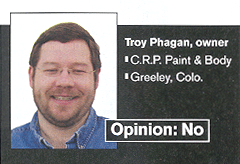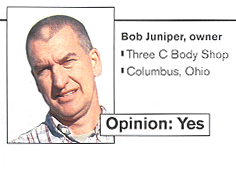
I find the practice of cost shifting morally repugnant. Why is it morally wrong and illegal (fraud) if I as a repairer charge a customer differently than the actual repair performed, but when an adjustor "bends" his company’s rules (even if it’s for our "benefit") that it’s somehow OK? I don’t understand the double-standard. The hypocrisy of it stinks.
If this train of thought in regard to cost shifting is carried forward to an extreme, why shouldn’t an adjustor cost shift some more and bury a customer’s deductible? Or justify a complete refinish on an older vehicle? Or cost shift damages so that prior damages get repaired? Or betterments swept aside?
Cost shifting demeans, disrespects and devalues the customer-shop-insurance relationship. It introduces an authorized level of deceit that leads to further corruption and double-standards. The deceit lies in the fact that the insurance company should be working FOR THE CUSTOMER, with the same good faith intentions as the repairer. The fact that cost-shifting even exists represents the insurance industry’s refusal to acknowledge and execute the NEEDS OF THE CUSTOMER as a priority.
Allowing cost shifting simply perpetuates the practice of short-changing customers at every given opportunity.
Secondly, allowing insurance adjustors to cost shift items instead of actually paying for a required item leaves the power in their hands and reinforces that power. Every time a required line-item procedure is cost shifted out of an estimate with a shop’s approval, it INCREASES the chance that you will NEVER see that legitimate line item actually entered onto an insurer-written estimate.
Ask an adjustor to cost shift, and the next sentence is "Well, I can do it just this one time …" And that’s exactly what happens. The legitimate line entry has now been tainted into the land of "Adjustor’s Choice," a.k.a. "Never seen again."
[It’s been pointed] out that cost shifting is not fraud nor illegal so long as the repairer presents an accurate invoice to the customer, separate from the insurer’s estimate. Again, this devalues, insults and debases the "Good Faith" requirements, legally and morally, of insurers meeting the correct, accurate needs of the customer.
Yes, it financially meets the needs of the shop, but it still represents a fundamental refusal of the insurance industry to truly see the customer as the priority. A lie, is a lie, is a lie.
Translating the physical, real-world actions required to repair a vehicle into the realm of intellectual data always involves some level of compromise. That’s why a "Fender Blend 1.0 HR" is listed as one single line, instead of every single action being translated:
Surface prep fender for blend: .2
Mask Areas around fender for blend: .2 … etc. to infinity.
When cost shifting is done due to the limitations of software and the complexity of translating the physical world actions of repair to the intellectual world of data, I can live with it. However, it’s the standard intentions behind cost shifting to justify the refusal for payment of legitimate operations that is simply wrong.

I’ve always taken the approach that cost shifting is acceptable through the business conditions that the insurance companies put the industry under. I firmly believe that insurers built that into their cost structure. They know it goes on. I believe insurers give their adjusters guidelines on what they can and can’t pay, and those guidelines are based upon the assumption that shops are cost shifting.
I’ve fixed a lot of wrecked cars over the years – I’ve been in business almost 30 years – and I still haven’t figured out how to turn a profit without doing it. Where we’re a little bit different is we let the customer know how the system works, and the authorization that we have our customers sign empowers us to do the repair at our discretion – however we’d like to do the repair … even if it differs from the insurance company’s estimate. So we have some protection built into our system…
I can understand how the small operations – the three- and four-man operations that are kind of doing one car at a time – could work through the process with insurers one at a time, but when you’re doing any kind of volume, I just don’t see how you can get away from moving the money around…
In my mind, when we’re negotiating with an insurance company, we’re really not negotiating specifically on each particular thing because we don’t really know what it’s going to be in the end anyway. How can you say nine hours on a quarter panel repair? We’re just taking a shot in the dark. It could be two hours. It could be 16 hours, depending on what you run into. So although the rules are that we’re going to agree it’s a certain number of hours, in my mind, all we’re agreeing on is how much money you can show me at the bottom line – and then I’ll take that dollar amount, and I’ll go backward and create a repair order that will produce a safe, quality repair for the money I have to work with.
I absolutely agree beyond a shadow of a doubt [that the fact that cost shifting even exists represents the insurance industry’s refusal to acknowledge and execute the needs of the customer as a priority]. The opponents of cost shifting must be liberals because they want a perfect world. … For now, this is the only way to make a profit and we’re not making the rules. If our industry ever gets smart and starts making the rules, then we won’t have to do it anymore, but I don’t see that happening any time in the near future…
Also, I view the vehicle owner as the customer, and not everybody does that. If I changed my relationship with insurers, I might change my attitude. If I viewed the insurance company as the customer like so many shops do, there you start getting into moral issues…
I think the body shop’s only responsibility is to produce a safe, quality repair and to make a profit doing it. There is a responsibility to make a profit. … If the rules are such that you can’t make a profit without cost shifting, then I would argue that there’s a responsibility to cost shift until the rules change…
My theory or philosophy is that the insurers allow their adjusters to pay at a certain level to allow the cost shifting to occur. How do you break the cycle? If I need to repair those pinch welds, show it to me on my line item and pay me to do it. But who’s going to step up, break the cycle and go broke in the process? I’m not.
It’s just business. I don’t think it’s morally wrong to cost shift. It’s just bottom line. And who’s setting the morals anyway? Whose moral standards are we living by? I sleep fine at night.













